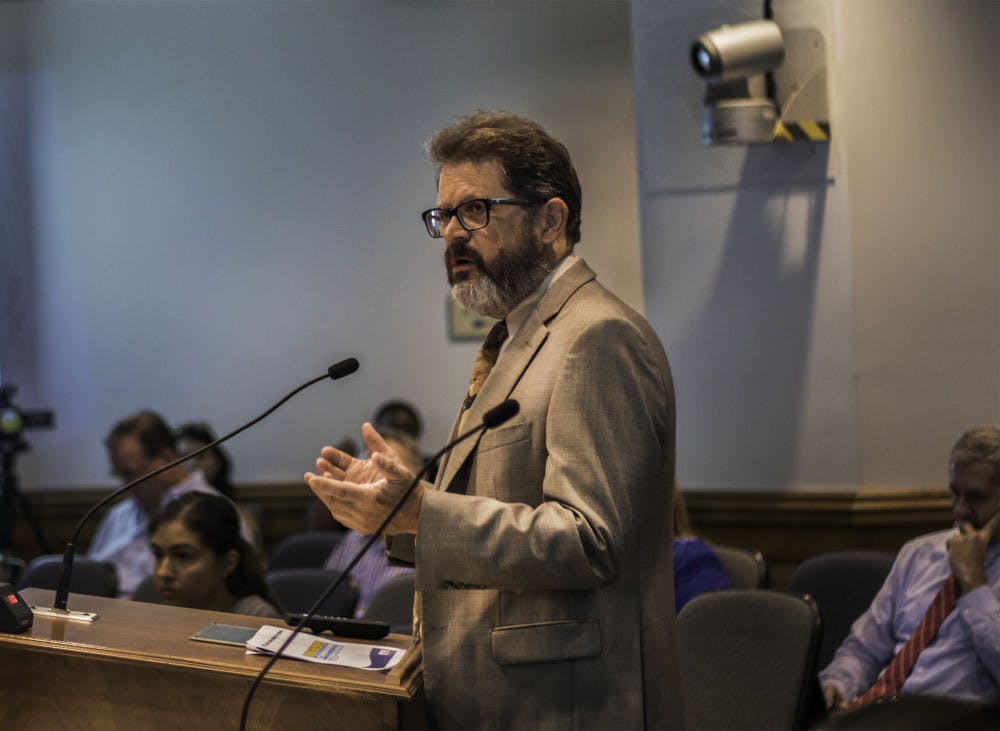After living in Gainesville for eight years, Danielle Chanzes shared her struggles with city commissioners during public comment.
She stepped up the lectern with her hand on her hip and took a deep breath.
The 26-year-old was frustrated and tired of turning her air conditioning off for months at a time just so she could afford to pay her utility bills.
Chanzes was at City Hall on Sept. 12 for the first reading of an ordinance to raise Gainesville Regional Utility rates by 2.3 percent. She wanted to make sure the Gainesville City Commission knew the struggles she and other residents faced before raising rates.
On Sept. 26, the commission made the decision to raise rates in a 4-3 vote, after more than 30 people voiced concerns during public comment. The new rates went into effect Oct. 1.
A month later, the Florida Municipal Electric Association released a report on Nov. 4, which ranked Gainesville as having highest residential utility rates in Florida for Sept. 2019. Data shows residents paid about $154 per 1,200 kilowatt hours during that month.
Confusion about the city-owned utility provider remains in the forefront of city politics, as the public continually voices concern for highest municipal utility rates in the state.
Michael Selvester, the GRU advisory board chair, said the biggest factor affecting utility rates is the purchase of the Deerhaven Renewable Generation Station biomass plant for $750 million in 2017.
After financing, it will cost the city more than a billion dollars, he said.
“I think ultimately it was the right idea because it still reaped the savings for the utility in the long run,” Selvester said.

Harold Saive, 75, holds up a protest sign while Jason Davis, 46, stands behind him noon Thursday along University Avenue outside of City Hall. Saive said he believes that most people support the cause but are too timid to protest in person. “For every person who shows up here there’s a thousand behind them who agree,” Saive said.
The city signed a power-purchase agreement with the plant owners, which cost the city $70 million a year to buy power, Selvester said. The potential payout over the life of the power purchase agreement was estimated to be more than $2 billion.
“I know that’s not a satisfying answer for a lot of folks to say, ‘Well now you only have to pay a billion dollars instead of $2 billion,’” Selvester said.
Selvester also said the relationship between Gainesville’s property taxes and the general fund transfer play a key role in determining utility rates. The general fund transfer is an annual payment from GRU to the city, which “represents a return on the city’s investment.”
More than half of the property in Gainesville, between UF, churches, schools and other public buildings, is not subjected to property taxes.
In 2019, about 30 percent of the city’s budget came from GRU and the general fund transfer, which provides money that is not collected through property taxes.
“That’s one of the reasons why the general fund transfer from the utility is such an important source of revenue,” he said.
Not only is UF’s property not taxed, its main campus also doesn’t use GRU, but instead is supplied by Duke Energy. The potential benefits of GRU supplying utilities to UF’s main campus is “something that’s not talked about enough.”
“It would have a huge impact on the city,” Selvester said. “It would probably be the single most impactful and beneficial thing that UF could do for the city of Gainesville right now.”
UF spokesperson Steve Orlando said the decision for UF to use Duke Energy was made decades ago. The Public Service Commission makes that decision.
As of 2018, UF’s 56,079 student population makes Gainesville a hotspot for student housing apartment complexes. Many of these complexes offer all-inclusive rent with a monthly pre-paid cap for utilities.
Erik Moore, a property manager at the Courtyards, said GRU does not offer any deals or tax breaks for the apartment complex.
“We pay the same kilowatt per hour that anybody else does,” he said.

Ernesto Martínez, 72, walks across University Avenue Thursday while protesting tax increases from Gainesville Regional Utilities. About 12 people gathered outside of City Hall to peacefully protest the rising energy costs. Protestors waved signs, chanted through a megaphone and handed out flyers.
All 91 Courtyards apartment units each have a meter which measures the amount of electricity used per month, Moore said. Each resident has a $30 cap for electricity. Other utility services such as water are paid for by the complex.
The increase in utility rates subjects residents to paying only a couple dollars in overages, he said.
“When you’re dividing that amongst four people, you’re not going to see it as big of a difference as you would in a residential community,” Moore said.
Some students that live in complexes like the Courtyards, will spend their entire time in Gainesville without ever seeing a bill — or rate increase — from GRU.
Maddie Stromak, a 19-year-old UF health science sophomore and Courtyards resident, has never experienced the effects of a high utility bill. When asked about GRU, she asked if it was a construction company.
But, she wasn’t surprised to learn Gainesville has the highest residential utility rate.
City Commissioner Adrian Hayes-Santos said the decision to change utility rates starts with GRU staff first evaluating the cost for utilities. The recommendation is usually passed to the Utility Advisory Board for review before going to the commission for a vote.
Hayes-Santos said addressing climate change plays a factor in rates. About 35 to 40 percent of electricity produced by GRU is renewable, which is the highest percentage in the state, he said.
“We have to be making moves to more renewable energy,” he said.
But residents like Chanzes still struggle to pay the high rates.
“I hope that the community can come together to find a solution and that GRU at least take responsibility for this because it’s just such a burden,” Chanzes said.
Gainesville Regional Utilities general manager Edward Bielarski Jr discusses increasing electric rates with the Gainesville City Commission on Wednesday during a meeting. Gas rates will increase by 0.57 percent, wastewater by 0.42 percent and water by 0.44 percent.






